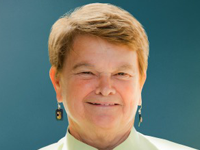Brandon Nichols, a veteran Los Angeles County official who’s spent years in leadership roles in the child welfare and probation departments, will take over as director of the Department of Children and Family Services beginning next month. The department — the nation’s largest local foster care agency — is responsible for tens of thousands of children and parents, and Nichols has pledged to make it more racially equitable and fair to families.

The county Board of Supervisors appointed Nichols on Tuesday following a six-month, nationwide search to replace former director Bobby Cagle, who stepped down in December.
The child welfare agency has been one of three safety net departments in L.A. with vacant leaders, along with the Department of Mental Health and the county’s homeless services authority. Nichols, who has been serving as interim director of the Department of Children and Family Services (DCFS) since April, will take the helm officially on July 1.
“Brandon Nichols is one of our County’s most capable senior leaders,” said Supervisor Sheila Kuehl in a press release. “He’s a great collaborator, has a track record for successfully implementing ongoing and new programs, is receptive to new ideas, and knows this complicated County like the back of his hand.”
As director of the sprawling child welfare agency, Nichols will be responsible for more than 9,000 employees overseeing 29,000 families out of 20 regional offices.
Nichols is a veteran large-department head. He started his career as an attorney with the Los Angeles County Counsel’s office and held senior and top leadership posts at DCFS off and on since 2012. Nichols then became the chief deputy of the county’s probation department, and in 2021 was appointed to lead a team tasked with closing the beleaguered Men’s Central Jail.

The incoming director has been part of several major child welfare reforms during his time in department leadership and previously working as county counsel, including county efforts to reduce the number of children sent to group homes and residential facilities and to increase reliance on family members over foster homes for children who have been maltreated by parents.
As county counsel, he was the lead attorney in the Katie A. v. Bonta lawsuit, which focused on the availability of mental health care for children in or at-risk of entering foster care. That 2002 class-action lawsuit resulted in a sweeping settlement that required Los Angeles County to develop a slate of new resources to help children with mental health or behavioral challenges remain at home, or live with foster families rather than be sent to institutions.
Nichols has also received support from the social workers union and local elected leaders.
“As Director, I want to help my staff to make the best decisions they can,” he stated in a Tuesday press release. “I want to work with communities to support families where they live, and I want to make sure we are confronting the problems of bias and racial disproportionality that have plagued child welfare programs.”
Nichols is stepping into the role at a particularly challenging time for DCFS. The department is staring down a $200 million budget deficit, though that may be recouped in the state budget being finalized at the end of this month. As a result, about 900 positions remain unfilled, amid a hiring freeze. While the department has continued to hire social workers, other county jobs including “parent partners” and human service aides, who help facilitate visits between parents and children in foster care, have been left vacant.
“The vacancies in the constellation of people immediately around the social worker are getting to the point where it is definitely impacting our service to families,” Nichols said at the June 6 meeting of the Commission for Children and Families.
He also pointed to the importance of increasing visitation between parents and children in foster care, vital connections that have been difficult to achieve during the pandemic.
“The issue of parent bonding has been a big one for our department over the last year and a half,” he said during a recent meeting of the county children’s commission. “I will be honest: I don’t think we’re doing a great job with it.”
DCFS has also been the focus of activists pushing the department to rectify long-standing racial inequities and to end practices that lead to Black families being disproportionately investigated by social workers and fractured by the child welfare system. Next month, DCFS will roll out a “blind removal” pilot project at two of its offices that will conceal the race of children when social workers are deciding whether or not to remove them from their homes, an attempt to deter implicit bias. The department is also pursuing internal management efforts aimed at reducing the number of Black children placed into foster care.
“I look forward to partnering with Mr. Nichols to do the hard work of right-sizing our child welfare system so that it heals families and protects vulnerable children,” Supervisor Holly Mitchell stated.
Despite these challenges, the number of children in out-of-home foster care in Los Angeles County is lower than it has been in several years, with 16,888 children living temporarily away from home last month.
Even with fewer children in out-of -home care, Nichols described L.A. County as operating in the midst of a “placement crisis,” with the agency struggling to find enough homes for infants and young adults through age 24 who remain in the state’s extended foster care program.

“We are finding that as we’ve done a better job of not taking folks into care that don’t need to come into care, that our population has gotten more and more complex, and the needs of that population are more and more acute — until it becomes harder and harder to serve them,” Nichols said at the recent children’s commission meeting.
The Reimagine Child Safety Coalition, which released a series of demands to the board of supervisors last year, said the county’s most vulnerable children and families need a leader who is willing to listen to the community members, especially those who have personally experienced the child welfare system.
“We need a leader who is willing to pivot from DCFS’s current practices of ripping families apart, and focus on prevention by providing families with the resources and support they need to thrive so that they don’t come in contact with the system in the first place,” a statement from the group sent to The Imprint Tuesday evening read. “This is especially true for Black and Indigenous families that are overrepresented in the County’s family regulation system.”
Nichols’ new job was described as requiring a “transformational leader with a track record of meeting large-scale challenges on a regional or state-wide basis.” Qualified candidates needed to demonstrate experience “turning around complex agencies.” For his new role, Nichols will earn an annual salary of $354,000.





